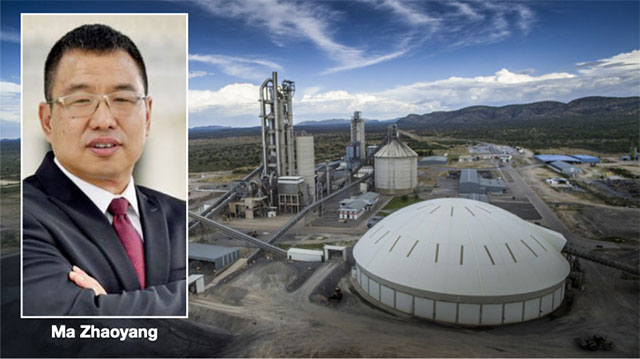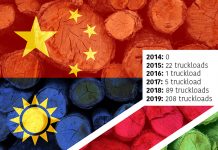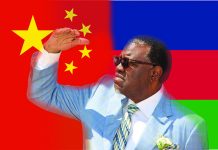By Shinovene Immanuel and Lazarus Amukeshe | 05 April 2019
TWO Chinese companies could dominate Namibia’s cement industry if a Singapore-registered company buys Ohorongo Cement for about N$1,5 billion.
Singapore Stock Exchange-listed company International Cement Group Limited announced last month that it has agreed to acquire Ohorongo Cement, which operates a plant near Otavi in northern Namibia.
Even though the decision needs the Namibian Competition Commission’s approval, little has been reported on the transaction’s critical details.
However, the latest information obtained from the Singapore Stock Exchange shows that International Cement Group was listed only a few days before talks around buying Ohorongo were publicised.
Although The Namibian could not establish a direct link between this company and the Chinese government, key people in the transaction and other past dealings connect the firm to Beijing.
International Cement Group’s principal shareholders include Zeng Zhang, Pang Douglas, Ma Zhaoyang and Gim Huat, who all have links to China.
The prospective owners of Ohorongo claim to benefit from China’s state-funded infrastructure plan known as “The One Belt, One Road” initiative.
The initiative is the Chinese economic infrastructure development and investment agenda in railways, energy pipelines, highways and streamlined border crossings that will connect China to the world and areas that have resources and are of economic importance to that country.
Details about Ohorongo’s link to China are included in a 20 March report submitted by International Cement Group’s chairman and executive director, Ma.
It is not clear if Ma was name-dropping the Chinese link about the project, but his Bloomberg executive profile states that he was a professor at the Chinese state-funded North-western Polytechnical University, and also served on the West China Cement Limited board.
Ma’s report focused on questions posed by the Singapore Stock Exchange around Ohorongo’s ownership, management, asset base and profitability.
His report titled ‘Response to SGX-ST queries on proposed acquisition of a 100% equity interest of a company in Namibia’, states that the group’s deputy chief executive, Cao Jianshun, will manage Ohorongo after the proposed sale is finalised.
He referred to Namibia’s agreement with China, signed in Beijing in September last year, as one of their reasons for buying Ohorongo.
“The signing signifies China’s recognition of Namibia as a bilateral partner in a comprehensive strategic and cooperative partnership ahead of the Forum on China-Africa Cooperation (Focac).
“At Focac, China and Namibia signed bilateral cooperation documents to promote cooperation in the construction of road and rail infrastructure, and capacity-building,” Ma said.
Despite promises of benefiting from the grand-scale Chinese project, Ma said: “There are currently no plans for any significant cash/capital injection for Ohorongo Cement in the next few years”.
CASH FLOW
International Cement Group said it will pay around N$1,5 billion to acquire 100% of Schwenk Namibia, which owns around 70% in Ohorongo Cement.
Schwenk Namibia is wholly owned by Schwenk Zement International, which belongs to a German family.
The remaining 30% shares in Ohorongo Cement are held by Industrial Development Corporation of South Africa (14%), the Development Bank of Namibia (11%) and the Development Bank of Southern Africa (4%).
Schwenk Zement International funded the construction of Ohorongo through a loan that now stands at N$1,2 billion. This loan is paid back from dividends that Ohorongo pays to Schwenk Namibia.
Schwenk Namibia’s decision to sell to a Chinese-linked company contradicts their promise on their website of selling Ohorongo shares to Namibians.
“It is the intention of the company to be 100% Namibian owned, and to transfer shareholding gradually to Namibian institutions once the greenfield risks are over,” Ohorongo Cement says on its website.
International Cement Group said they will buy Schwenk Namibia with borrowed funds, and that negotiations to raise the money are currently underway.
Ohorongo sales revenue from 2016 to 2018 was about N$3,3 billion, while its profit between 2017 to 2018 was about N$900 million.
Schwenk Namibia’s net tangible assets – excluding trademarks and brands – was N$942 million in 2018.
International Cement Group estimates the market value of the plant to be around N$2 billion, meaning they will be buying Schwenk Namibia at a 36% discount.
Calculations by The Namibian show that should the sale be concluded, the maximum possible tax on the sale of the shareholding would be around N$400 million.
Ohorongo started raising red flags last year, complaining that the introduction of a second cement factory was not sustainable in the current financial environment.
The company, which at some point employed 600 workers, announced in August last year that it was cutting its workforce.
The introduction of another Chinese player in the cement sector could set up a possible monopoly in the construction industry as Namibia prepares to take out development loans from Beijing.
Development Bank of Namibia spokesperson Di-Anna Grobler told The Namibian yesterday that they were not offered the shares, but Schwenk Namibia informed the bank about the plan to sell its stake.
“The shares that are being sold are those of Schwenk Namibia, which owns shares in Ohorongo Cement,” she said.
According to her, “the briefing on the sale of the shares adhered to the agreement between several parties holding shares in Ohorongo Cement”.
DBN added that “the bank is still a shareholder in Ohorongo Cement, and will evaluate its position once it has comprehensively reviewed the situation and the strategy of the new shareholder,” she stated.






